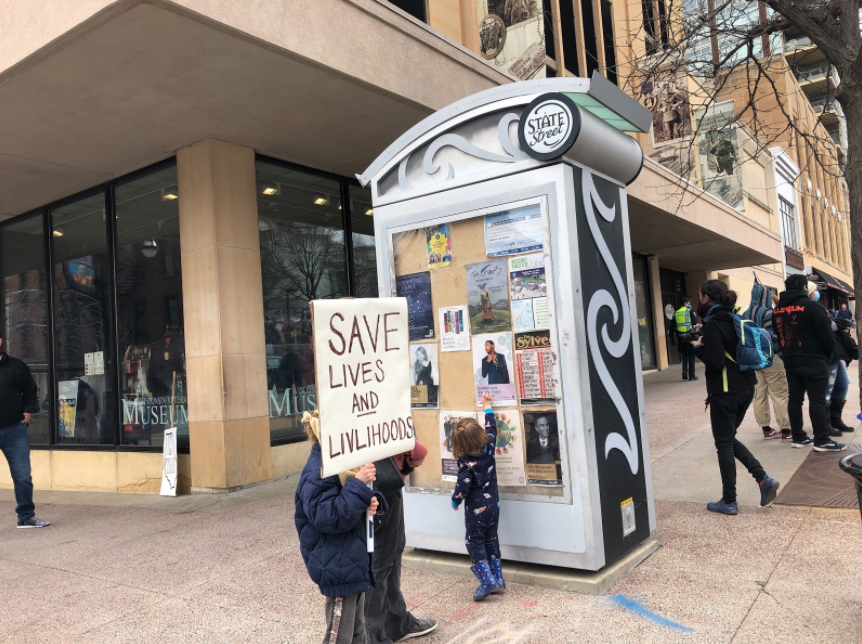Alone on the front lines: What the pandemic is like for those few workers whose jobs have been deemed essential

While people across the state protest to reopen Wisconsin businesses, those workers whose jobs have stayed open share their experience navigating a post-COVID world.
Transcript:
Natural Sound: Let Freedom Ring, sung at the Reopen Wisconsin Rally
VO: On April 24th, approximately 1,500 people gathered outside the Capitol to protest Governor Evers’ Extension if the Safer at Home Order
VO: Some protestors carried signs that said things like “any job that puts food on the table is essential” and “save lives and livelihoods.”
VO: However, for those workers who have been deemed essential, being able to go to work can sometimes mean having to choose between their health and their income.
VO: Katherine Johnson, a senior at the University of Wisconsin and a cashier at Whole Foods says that for her, continuing to go to work is not a choice.
Katherine Johnson: People are sometimes like I respect your decision and it’s kinda hard because this isn’t necessarily a decision that I’m making. Like I could either quit my job or take time off and then not have a source of income.
VO: Robyn Freuck a BSN RN at Aurora West Dallas Labor and Delivery, says that continuing to work poses a risk for both her and her family.
Robyn Freuck: I’m a single parent and luckily we haven’t had any patients, like I said, on our floor who have tested positive per say, But I already have a plan in place for my son. Like if we have a patient that’s positive he’s staying with my mom permanently until this all resolves.
VO: Ben DeVore, a warehouse associate at Co-op Partners says that with the pandemic driving a higher demand for food, he is actually now working overtime.
Ben DeVore: I think the biggest thing was just how, like just the pace increased so much more and also what it was, is I think a big thing, is we just ran out of products so quickly. And so I had never seen the shelves that empty.
VO: In the midst of this chaos workplaces are scrambling to implement new safety regulations.
Johnson says that at Whole Foods things change everyday.
Johnson: Every single time I’d come into work there’d like, be a new protocol. Like before you clock into work you have to have your temperature taken. So like if you have a temperature over I think it’s like 100.4 you have to go home and like self-monitor for a few days. so they do that and now, at the start nobody was required to wear masks but as of like a week or two ago everybody who works there has to wear a mask. Just like a lot of cleaning happening and just like a lot of other stores we installed like the plexiglass stuff so there’s like a little bit more of a barrier between like customers and the employees as well as like markers of six feet around the store.
VO: However, Freuck says that some of these regulations are dependent upon the available resources.
Freuck: at first it was, you can only wear one mask, you get one once a week. So you’re wearing these masks up to forty plus hours a week and now it’s we get a different mask when we walk in, one after lunch, one like halfway through our day. It’s just, I think they’re just kinda making it up as they go.
VO: Johnson says that these rapid changes have made an already difficult situation even harder.
Johnson: I’m trying to figure out this online school thing but I also have to like do my job which is now ten times more stressful than it ever was before.
VO: Freuck says that the best way to navigate this challenging situation is for people to stay home.
Freuck: They’re protesting at Brookfield Square the Stay at Home Order, which is just completely arrogant. Like if I had the option to stay at home and live my life that way that’d be cool too. If people just stay home and stop complaining this will be over sooner and we can all get back to our lives.
VO: This recent push to reopen the economy, will put others at risk, Johnson says.
Johnson: I feel like this is coming up a lot right now with the protests that are happening and like you see those kind of things that like go viral on social media, and it’s like those protestors like that one woman who was like I want a haircut and it’s like ya, maybe you want a haircut but the person whose giving you the haircut is gonna be the one who is like actually suffering in this equation. Like you don’t want to go out you want someone else to go out.
VO: With the threat of becoming infected hanging in the air, many things remain uncertain for these workers. However, Johnson says that one thing’s for sure– these jobs have always been essential.
VO: From the J335 newsroom, I’m Molly DeVore
